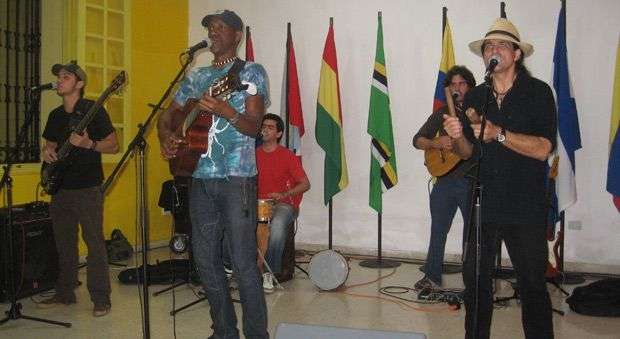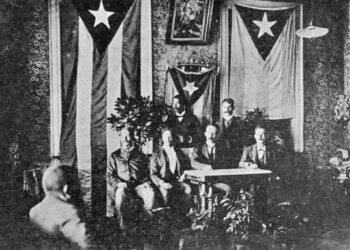Tony Avila will present his CD Timbiriche next October 30 at 7 pm, at the ALBA Cultural House . “We chose this place because it is an open space, and more people can go , they will not have to pay a cover , and then the money they save on this they can spend it on the record.” This Havana man told us, but for journalists like me born in Matanzas, is a pleasure and an honor that his first songs made their debut there.
Timbiriche is a concept. What feeds, in terms of music, this album?
This album follows in the footsteps of the phonogram En Tierra, based on the variety, the diversity of genres and themes of the songs. In this sense we can say that we did some market case, we cannot forget that in the end there is a destination. It’s an album that like in my songs generally feeds on the daily experiences of Cubans. From concepts like existentialism, humanism, philosophical concepts, like life and death and the fact of being in society.
It’s a record with fifteen songs that travels somewhat by issues that deal most directly with me. It begins with Birth which is a song about my birth, and closes with the theme Mother, a song dedicated to my mother. In between you can find Havana, which is a song that tells of my nostalgia because I left so small and now I am back with my songs and my guitar. It also has Four walls to love, which is closer to me, my children, my brothers, pain and happiness, approaches as I am, where I come from and perhaps where I’m going.
It also has a mixture of Guaracha, two-way talk, social issues. In terms of loudness is a more solid album than En Tierra, because there is more musical elements, without distorting the sound elements of my group.
Timbiriche was built with a very practical philosophy and Pedro Luis Ferrer advised me: the disk is done in concert with the public, you’re just going to record what you know the disc is.
What elements of continuity and change there are from the gatherings in the Patio de los cangrejos in Cardenas to Tony a la carte in the Bertold Brecht?
There is always a break, from the time you move from one place, from one stage to another, no geographical breakdown, physically. At the exact moment when your work begins to be inserted into a wider audience, there is also a break; you’re permeated by other codes, and other influences. In fact, other songs are being born which are parts of the same break.
But in essence there is a clear continuity, I’m still the same from when I started with my guitar until today, personally and professionally, maybe a little sharper. It is this dichotomy of change and to break but being the same in essence, with your feet on the ground.
You have worked with your group for eight years, how does this influence the composition of your music?
At first I had some concern whether it was appropriate or not, if I have a group tied to me, but I think my music will essentially sits nicely on the accompaniment of a band like this, which is small, and that makes it a great family people who defend both my music and does it greatly, I could not betray ever that will of them.
The group influences and influences for good. There are excellent musicians who contribute their talent and not just decorate or put a dress on what I do. They really transform my music, without letting it get lost in that context of change or assembly or when one puts more musical elements to a song.
What advantages and disadvantages are there to stay in Matanzas and also keep in presentations Havana?
Being outside the capital steals some immediacy of being in the moment you need and maybe you cannot be. At the same time being outside for a while I get a little rest and the public also rests from me and my songs. I I have respect for the phenomenon of ” peñismo ” , to give it a name , which is when one has a gathering, but then go to the other musicians and performs again , and when you repeat a lot people tend to get bored and one also begins to get tired. The fact I do not live here steals the immediacy, but not the presence.
Can you tell us how the call to the Guaracha contest “A mí me gusta que baile Marieta” is going?
The intention of the competition is to revive the Guaracha we inherited from Nico Saquito and El Guayabero rose with his style to the top. We want the contestants to respect the language, it is the way to help stop a ruthless little deterioration suffered by the language from music, culture, from life in general, and that Guaracha serves as a this retaining wall, and show people from the same popular voice, not to use as many bad words, or go to the vulgarity, or banality, not to denigrate or discriminate against anyone.
Moreover, El Guayabero deserves all the tributes in the world and I think it is a small contribution to his work to continue and endure. The contest has already confirmed their admission jury and the prize, among which you could advance the researcher Toni Pinelli , the troubadour Ray Fernandez and David Alvarez. I have sent some works. A spot for television is about to be released. Among the organizations that sponsor the contest are Bis Music , Company of Music in Havana , the Cuban Institute of Radio and Television and the birthplace of Guayabero . They have added many figures who have left their mark on Cuban culture like Silvio Rodríguez , Marta Campo, Adalberto Alvarez.
The contest has an elaborate design. The endpoint is a record we want to do with the 10 or 12 best songs, and what is done with that record on trade issues is intended to be used at the Guayabero house, which they are trying to restore. Bis Music suggested also do a second volume of Guayabero songs sung by jurors, and so would a double volume with a tribute by the winners and the songs sung by the jury.
They are working on a fixed place that worships Guaracha: What could you tell us on that?
This is an idea that excites me and worries me, because I have been given the responsibility of hosting the place. The intention is to create a space; I think that it does not exist in Cuba, where to worship the genre. We still need to dream it, think it up right. For now we want you to call it Guaracha and is to have music all day like this, with a cuisine that has to do with gender and has a pleasant atmosphere, for which I wish to transfer the Cuba of the 1920s and those who want to hear Nico Saquito to Matamoros, can go there. We also have live music. Now the project is being handled by the teacher Toni Pinnelli, one of the promoters of this idea.
When you compose music for film or television you do not feel difference between the Tony of the gatherings and the composer for the media; how do you see it?
I see it that way, because that’s how I do it. When you call me and charge me a work of this kind is not a character I ride for that. Also sometimes show first works that I have made, as they may fit and work. I like the challenge of writing songs for a particular work, because you always drive to play a new edge, a genre that I have not addressed in my music, as in the case of music for the work La Pamplinera for the Miron Cubano troupe in Matanzas, where I had to make a reggaeton or jazz.
In a previous interview you expressed that you were not intending to be spokesman of marked social issues, do not you think that when people identify with your songs and sings them, the responsibility comes?
I say that without meaning there is no one makes a song and it is an act of creation, that deep is also aware. From creation is passed to the idea, the concept and state of opinion, point of view. Now when you throw that to the public and people humming and makes it theirs and use it in their life up to defend, there becomes a responsibility that bounces like a boomerang, and I like that, flirting with the responsibility of seeing that happens.
One becomes spokesman inadvertently of what people want to say or want to express , as in the case of subjects like My casa.cu , part of speech of the people, although rephrased . In essence that pleased me. As long as my songs become examples of what people want to express and build, then I assume such a responsibility.
For: Mayté Madruga Hernández










